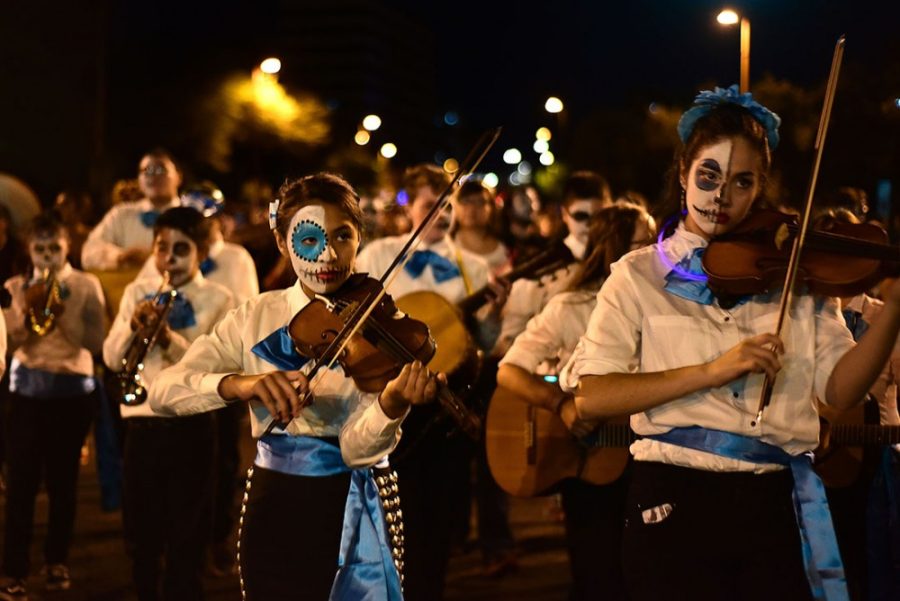The All Souls Procession is Tucson’s annual event that inspires the community to come together and celebrate life and death.
The procession takes place each year around the Day of the Dead, a holiday to commemorate the people who have left this life before us. The concept is celebrated in many different cultures, including in the famous Mexican Día de los Muertos celebrations.
The All Souls Procession began with an artist’s wish to honor her father, who had recently passed.
In fall of 1990, Susan Johnson wanted to create something artistic to help her express the mourning of the loss of her father. She did so in the form of a ceremonial performance in her studio, then a procession in downtown Tucson.
“I wanted to honor his life, but also to process kind of the insanity that we lived with, because my dad was a World War II veteran,” Johnson said.
After the first procession, some people wanted to make the event annual, and Johnson received a grant for the arts workshops that teach people how to create the art they can carry during the procession.
Johnson also wanted a way for people to come together as a community, because she felt art was a good way to cope with loss and to connect people to others, and to the idea of death. She wanted people to honor anything of importance to them.
RELATED: Four things to do this November
“Because then people are making things together and share that kind of depth, and also they make things in connection with the death of someone …” Johnson said. “Then it just has a lot more meaning to it, you know, it helps you process it.”
Johnson admired the Mexican Day of the Dead festivity and how it connects to the idea that “we all have to go through this process of death.”
She also felt that profound celebrations like the procession are things people need. That’s one of the reasons why people are attracted to the All Souls Procession, even if they don’t know what it’s about at first.
“And even if people are participating and they don’t even realize what they’re participating in, at some point they may, or they will,” Johnson said. “They will experience some kind of death and [the procession] will have some kind of different meaning for them.”
She said her grandfather used to tell her, “everything that lives — dies. And everything that dies gets reborn again or goes through a transformation [to become] something else.” For Johnson, this something that she still strongly believes.
Johnson likes that aspect about the All Souls Procession. She feels that people are allowed to creatively express themselves openly. In the beginning, Johnson was honoring the memory of her father. This year, she will participate in these festivities with her late husband in mind.
“This year is really important, too, for my husband, who I’m still processing and grieving his loss but celebrating his life and honoring his new transformation, whatever that may be,” Johnson said.
Nadia Hagen, the artistic director for the All Souls Procession, also believes the community event gives people the means to connect with the universal concept of death in a way that is emotionally meaningful to them.
The first All Souls Procession was a small intimate ordeal of 25 artists. Today, it has grown significantly, to about 100,000 participants in the procession, according to Hagen.
“We’re all going to lose people, and we’re going to lose things in our lives. We need rituals; we need ceremonies … we really need to feel connected to other people, to other humans,” Hagen said.
RELATED: Face painting a symbol of unity at All Souls Procession
The All Souls Procession is also subject to change, like any living thing. The celebration has grown in number of participants, moved routes and is celebrated on different days. However, Hagen said the spirit of participation in the procession lasts.
“As far as how people participate and the kind of structure where people start building things a few weeks out — building puppets, creating masks and costumes and then coming out on the streets — those things have remained constant,” Hagen said.
She said one of the reasons that she works the All Souls Procession, despite it not being a secure source of income, is because of the emotional connection she feels to its purpose.
“I’m in that boat of people that has had a lot of people die in my life,” Hagen said. “I’ve had family members, I’ve had friends, I’ve had a lot of people leave and those people were really important to me, and I still feel like it’s important that I honor their memory.”
She feels that it’s important to remember and honor them, especially when their deaths were more recent.
Hagen also said that this thought is what is truly important to participants.
“I read tons of letters and all of the feedback I get with that is very important to a lot of people. So it’s a service,” Hagen said.
For more information about the events in the All Souls Procession and the events coming up for it, check out: allsoulsprocession.org
Follow the Daily Wildcat on Twitter









